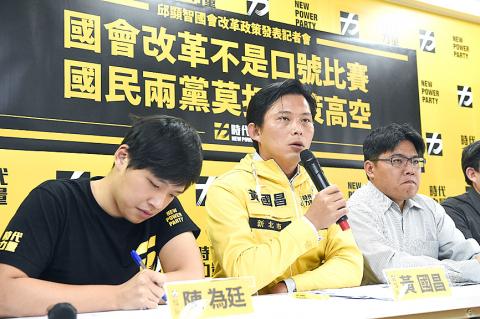New Power Party (NPP) legislative candidates yesterday castigated “insincere” Chinese Nationalist Party (KMT) proposals for reforming the Legislative Yuan, calling for meaningful restrictions on the legal role of cross-caucus negotiations as part of any reform package.
“It is fundamentally about manipulating the election and cheating votes out of people,” said NPP legislative candidate Chiu Hsien-chih (邱顯智), adding that the KMT’s legislative caucus had previously repeatedly rejected reforms similar to those proposed by Legislative Speaker Wang Jin-pyng (王金平) last week.
Chiu’s campaign manager, Chen Wei-ting (陳為廷), a prominent leader in last year’s Sunflower movement, called proposals by Wang “fake” and “non-democratic.”

Photo: Chen Chih-chu, Taipei Times
Wang last week called for drafting new legislation to clearly spell out committee hearing procedures along with other changes, calling on the Democratic Progressive Party (DPP) to present a competing proposal by Thursday, at the same inviting Chen and fellow Sunflower leader Lin Fei-fan (林飛帆) to meet and discuss legislative reform.
Chiu said Wang’s proposal would further increase the power of the legislative speaker and the different party caucus whips, to whom it would dedicate sole power to call cross-caucus negotiations, removing current legal provision allowing individual legislators to use a petition drive to initiate negotiations.
“Our main criticism of cross-caucus negotiations is that they are extremely authoritarian — concentrating power in the hands of a few, while diluting the power of individual legislators to exercise their legislative authority,” he said, adding that removing individual legislators power to call talks would be “taking a step in the wrong direction.”
Hsu Wei-chun (徐偉群), a professor of law at Chung Yuan University, said that under current rules, any results of cross-caucus negotiations are sent directly the legislative floor where they are passed automatically, unless eight or more legislators sign a petition requiring a vote. Speeches about the results can be made from the legislative floor only by party representatives designated by party leaders, he said.
Citizen’s Congress Watch executive director Chang Hung-lin (張宏林) said the secrecy of cross-caucus negotiations allows legislators to avoid taking a stance on controversial legislation, adding that its existence also discouraged legislators from investing time in budget reviews.
“Every time you work hard to conduct a review, if there is any disagreement, then a cross-caucus negotiation will be called — so what is the point of working hard to review every budget item? Our budget review process has already degenerated into cross-board cuts decided via cross-caucus negotiations,” he said.
Chiu called for use of cross-caucus negotiations to be limited to parliamentary procedure, such as agenda setting, rather than the specific content of bills.

A preclearance service to facilitate entry for people traveling to select airports in Japan would be available from Thursday next week to Feb. 25 at Taiwan Taoyuan International Airport, Taoyuan International Airport Corp (TIAC) said on Tuesday. The service was first made available to Taiwanese travelers throughout the winter vacation of 2024 and during the Lunar New Year holiday. In addition to flights to the Japanese cities of Hakodate, Asahikawa, Akita, Sendai, Niigata, Okayama, Takamatsu, Kumamoto and Kagoshima, the service would be available to travelers to Kobe and Oita. The service can be accessed by passengers of 15 flight routes operated by

Chinese spouse and influencer Guan Guan’s (關關) residency permit has been revoked for repeatedly posting pro-China videos that threaten national security, the National Immigration Agency confirmed today. Guan Guan has said many controversial statements in her videos posted to Douyin (抖音), including “the red flag will soon be painted all over Taiwan” and “Taiwan is an inseparable part of China,” and expressing hope for expedited reunification. The agency last year received multiple reports alleging that Guan Guan had advocated for armed reunification. After verifying the reports, the agency last month issued a notice requiring her to appear and explain her actions. Guan

GIVE AND TAKE: Blood demand continues to rise each year, while fewer young donors are available due to the nation’s falling birthrate, a doctor said Blood donors can redeem points earned from donations to obtain limited edition Formosan black bear travel mugs, the Kaohsiung Blood Center said yesterday, as it announced a goal of stocking 20,000 units of blood prior to the Lunar New Year. The last month of the lunar year is National Blood Donation Month, when local centers seek to stockpile blood for use during the Lunar New Year holiday. The blood demand in southern Taiwan — including Tainan and Kaohsiung, as well as Chiayi, Pingtung, Penghu and Taitung counties — is about 2,000 units per day, the center said. The donation campaign aims to boost

The Central Weather Administration (CWA) said a magnitude 4.9 earthquake that struck off the coast of eastern Taiwan yesterday was an independent event and part of a stress-adjustment process. The earthquake occurred at 4:47pm, with its epicenter at sea about 45.4km south of Yilan County Hall at a depth of 5.9km, the CWA said. The quake's intensity, which gauges the actual effects of a temblor, was highest in several townships in Yilan and neighboring Hualien County, where it measured 4 on Taiwan's seven-tier intensity scale, the CWA said. Lin Po-yu (林柏佑), a division chief at the CWA's Seismological Center, told a news conference